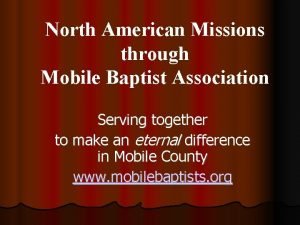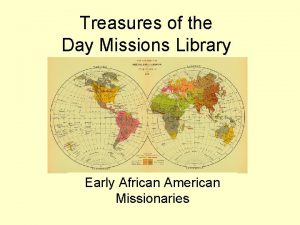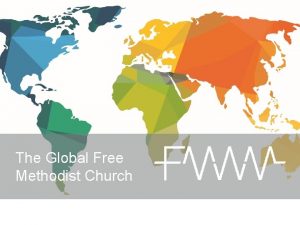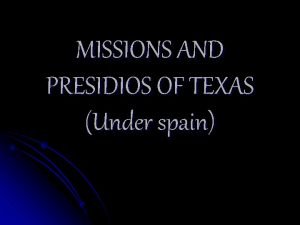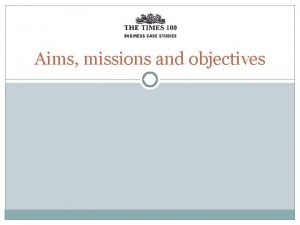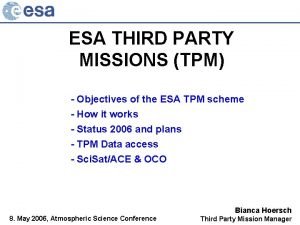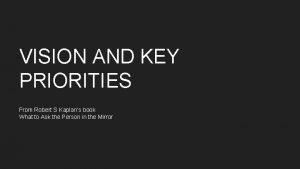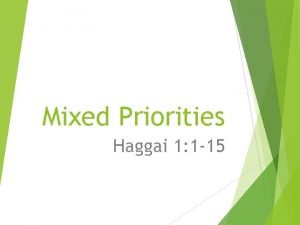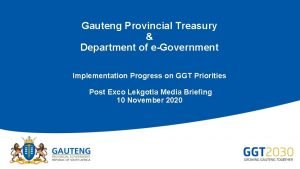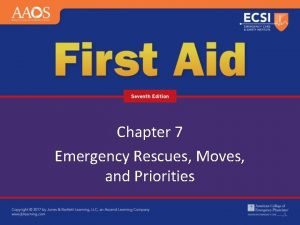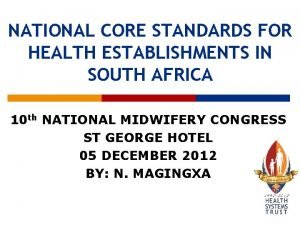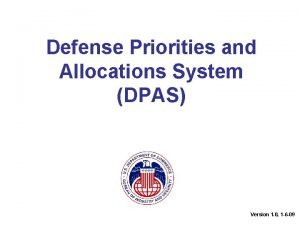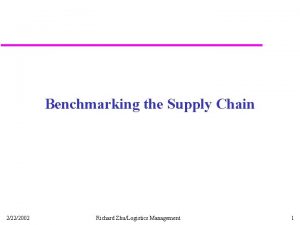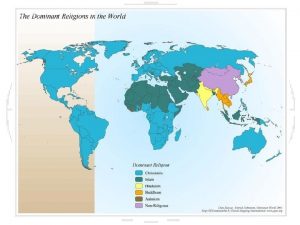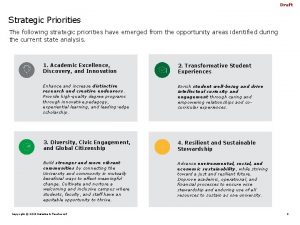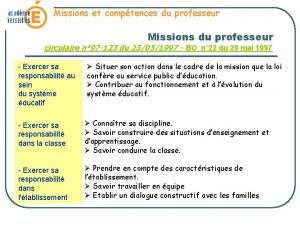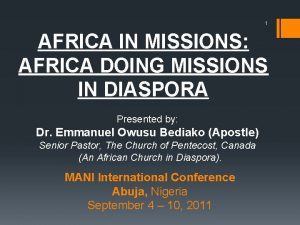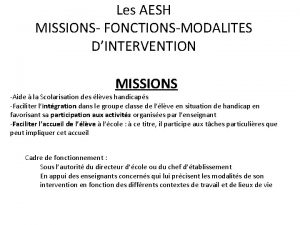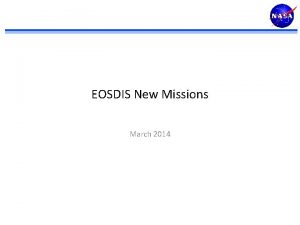Missions Priorities Where are the people who have

















































- Slides: 49

Missions Priorities Where are the people who have not heard about Jesus? Where should we prioritize taking the Gospel?

Prioritization of the Great Commission (Overview) • There is a great need to prioritize the Great Commission. Greater emphasis needs to be placed on bringing the awesome truth of Jesus to the least reached. • 80% of missionaries are among evangelized (nominal) Christian people groups and a very large portion of Christian resources are in the U. S. • There are many people who have heard little or nothing about Jesus and have almost nobody praying for them (by name) or who can tell them about Jesus. • We need to prioritize these unreached people so we can obey our Master and complete the task He's given us all to do. • We can pray more for those who have not heard the truth about Jesus and we can reallocate the resources at our disposal in order to more significantly impact the world for eternity.

Past Fruitful / Successful Missions • Christian missions have been successful in many places like sub-Saharan Africa • Just like a successful investment portfolio requires reallocation to strategically distribute resources (especially when do well in some areas and not in others), effective Great Commission outreach requires reallocation of resources.

Completing the Great Commission • Jesus told us to make disciples of all ethne / ethnos (people groups) • In order to do this, we Christian disciples must be engaged with all ethne • At present, there are many peoples with little or no Gospel witness • In order to fulfill Jesus’ last command, we must make it a high priority • This requires that we send people and resources where they are currently sparse but in very great need

Where are the majority of gospel / Christian resources?

If resources were distributed equally, they would be distributed according to: Source: Barrett, David, and Todd Johnson. World Christian Trends AD 30 – AD 2200. Pasadena, CA: William Carey Library, 2001. (WCT)

Actually: Source: Barrett, David, and Todd Johnson. World Christian Trends AD 30 – AD 2200. Pasadena, CA: William Carey Library, 2001.

0. 51 x proportional share 7. 4 x proportional share 0. 0018 0. 017 0. 0083 0. 049 Afghanistan 0. 000072 x proportional share 1. 3 < 1. 0 (Has less than country’s fair share person) = 1. 0 (Has country’s fair share person) Data Source: World Christian Trends, Barrett & Johnson > 1. 0 (Has more than country’s fair share person) Ratios of Countries’ Portions of the World’s Christian (Personal or Church) Income on a per Person Basis Lowest Ratio (less than country’s portion) Highest Ratio (more than country’s portion)

Source: Barrett, David, and Todd Johnson. World Christian Trends AD 30 – AD 2200. Pasadena, CA: William Carey Library, 2001.

$130, 000 $1, 551, 000 $15, 800 $9, 800 $171, 800 $40, 800 Afghanistan $30, 400 Mozambique $1, 400 Data Source: World Christian Trends, Barrett & Johnson Cost Effectiveness of World Missions Based on the Cost to Lead to the Baptism of a New Convert Most Effective Least Effective

David Barrett on Good Missions Stewardship “Dollar for dollar and hour for hour, the harvest coming from the 10/40 Window nations outstrips that from the rest of the world 100 to 1, ” Barrett says. “That is, if the same money and time spent to win one person to the Lord in the West were put to use in the 10/40 Window nations, the effort would yield a harvest of 100 souls added to the kingdom of God. It is 100 times more cost effective, therefore, to reach those in the 10/40 Window. But for a sizable number of ethnolinguistic groups, cost-effectiveness reaches 1000 times more than in Western countries. ” World Christian Encyclopedia

Source: Barrett, David, and Todd Johnson. World Christian Trends AD 30 – AD 2200. Pasadena, CA: William Carey Library, 2001.

1. 6 x proportional share 0. 034 6. 0 x proportional share 0. 022 0. 0097 0. 090 0. 33 0. 29 0. 97 Afghanistan 0. 0035 x proportional share < 1. 0 (Has less than country’s fair share person) = 1. 0 (Has country’s fair share person) Data Source: World Christian Trends, Barrett & Johnson > 1. 0 (Has more than country’s fair share person) Ratios of Countries’ Portions of the World’s Christian Workers on a per Person Basis Lowest Ratio (less than country’s portion) Highest Ratio (more than country’s portion)

Source: Barrett, David, and Todd Johnson. World Christian Trends AD 30 – AD 2200. Pasadena, CA: William Carey Library, 2001.

0. 18 x proportional share 0. 054 5. 0 x proportional share 0. 0070 0. 0078 0. 056 0. 33 0. 52 Note: Most of the red or orange nations are islands Data Source: World Christian Trends, Barrett & Johnson 0. 21 Afghanistan 0. 0035 x proportional share < 1. 0 (Has less than country’s fair share person) = 1. 0 (Has country’s fair share person) > 1. 0 (Has more than country’s fair share person) Ratios of Countries’ Portions of the World’s Christian Periodicals on a per Person Basis Fewest Most

Source: Barrett, David, and Todd Johnson. World Christian Trends AD 30 – AD 2200. Pasadena, CA: William Carey Library, 2001.

268 0. 034 368 <1 2 <1 16 13 29 562 Afghanistan 0. 02 Data Source: World Christian Trends, Barrett & Johnson Number of Evangelistic Offers or Opportunities to Become a Disciple per Capita per Year Fewest Most

Needed in the U. S. • Clearly the U. S. has more than her share of Christian finances, resources, and ministers. • Thus, the U. S. does NOT need more money to obey the Great Commission in this nation • Obedient followers of Jesus with vision (from the Lord) are needed

The Great Need for More Emphasis on Reaching the Unevangelized with the Gospel

It has always been my ambition to preach the gospel where Christ was not known, so that I would not be building on someone else's foundation. Rather, as it is written: “Those who were not told about him will see, and those who have not heard will understand. ” Romans 15: 20, 21 And they sang a new song: “You are worthy to take the scroll and to open its seals, because you were slain, and with your blood you purchased men for God from every tribe and language and people and nation. ” Revelation 5: 9 After this I looked and there before me was a great multitude that no one could count, from every nation, tribe, people and language, standing before throne and in front of the Lamb. They were wearing white robes and were holding palm branches in their hands. Revelation 7: 9

Imbalanced Evangelistic Activity There IS enough evangelistic activity to reach the whole world: • Enough activity for every one in the world to hear a 1 -hour presentation of the Gospel every other day all year long • Over 1, 430 billion hours of evangelism generated by Christians every year: personal witness, radio, TV, Internet, literature, etc. But this evangelistic activity is unevenly targeted: mostly at other Christians • As many as 86% of all Muslims, Hindus and Buddhists do not personally know a Christian. From: Justin Long, www. Momentum-Mag. org, Aug. 2007 Source: World Christian Encyclopedia

The Unfinished Task • 28% are without access to gospel • 39. 5% of the world’s individuals are members of ethne with no viable church • While 72% of the world is adequately evangelized, 1, 800, 228, 000 are left. * *David Barrett, Todd Johnson and Peter F. Crossing, “Status of Global Mission, 2005, in Context of 20 th and 21 st Centuries, ” International Bulletin of Missionary Research, Jan. 2005, p. 29. Source: Stan Park, Ethne ’ 06

World Population Foreign Missionaries Source: Operation World, World Christian Encyclopedia, USCWM, JP, GMI

Cross-cultural Missionaries per Million in Major Blocs Source: Todd M. Johnson & Mission Frontiers Magazine, June 2000; Stan Park, Ethne ’ 06

Challenges of the Unfinished Task Imbalance in Missionary Distribution • Over 80% of all cross-cultural foreign missionaries minister among nominal Christian peoples. • For every million unreached Muslims there are less than 3 missionaries Imbalance in Missions Finances Question: For every $1 of Christian giving to all causes how much goes to financing pioneer church planting among unreached peoples? Answer: Half a penny Source: Joshua Project

Christian Giving • Average Christian gives 1. 8% of their income • 5% of Christian giving goes to missions (15 billion) • More is lost to embezzlement (16 billion) than is given to missions • Of mission funds -- between 0. 1% and 1. 66% is focused on unreached Source: Stan Park, Ethne ’ 06

Christian Ministers’ Focus • 95% of Christian ministers focus on their own people • Of the 5% who become missionaries, 80 -90% focus on ethne which are majority Christian • Only 2. 5 – 4% of missionaries are focused on the 25 - 28% of the world who are unreached Source: Stan Park, Ethne ’ 06

Status of Urgency for the Unreached • Majority of Christians still not aware of the challenge of the unreached • Many that are aware feel it is not their responsibility • Many church and mission leaders feel that missions to the unreached has been over-emphasized Source: Stan Park, Ethne ’ 06

Will We Change? If current patterns continue, the unreached will still be 23 -28% of the world’s population in 2025 “Insanity is doing the same thing over and over again and expecting different results. ” Source: Stan Park, Ethne ’ 06 Albert Einstein

The number of missionaries amongst the unreached remains terribly low. 2% 25% 73% 9% 36% 55% No Access 50, 000 Evangelized Non-Christian 10, 000 24% 40% 36% 200, 000 15, 000 22, 000 1925 1950 1975 300, 000 2000 2025 From: Justin Long, www. Momentum-Mag. org, Aug. 2007 Christian 2050 Source: World Christian Encyclopedia

Where Are Missionaries Needed the Most? • Unreached people groups • Least evangelized world or unevangelized world (“World A”) • 10/40 Window

Christians and the Unevangelized Source: Operation World, World Christian Encyclopedia, USCWM, JP, GMI

Missionary presence Source: Operation World, World Christian Encyclopedia, USCWM, JP, GMI

Percent Unevangelized Per Country Source: Operation World, World Christian Encyclopedia, USCWM, JP, GMI

Unevangelized Population (in millions) 1 India 344, 000 2 China 262, 000 3 Pakistan 144, 000 4 Indonesia 68, 600, 000 5 Iran 48, 700, 000 6 Thailand 34, 100, 000 7 Algeria 32, 900, 000 8 Morocco 30, 900, 000 9 Bangladesh 30, 000 10 Afghanistan 26, 000 Majority of the Unevangelized World Source: Operation World, World Christian Encyclopedia, USCWM, JP, GMI

Countries with the Most Unreached Peoples Country Nepal Pakistan India China Bangladesh # Peoples # Unreached Peoples India 2332 2082 China 499 406 Pakistan 401 386 Bangladesh 370 336 Nepal 315 292 Source: Operation World, World Christian Encyclopedia, USCWM, JP, GMI


Where Are the People Who Have Not Heard About Jesus? • Most Christians can more easily locate countries rather than people groups • Joshua Project* and WCT missions information was used to prioritize the nations using ten criteria • Data for 15, 893 people groups and 222 countries were used to evaluate the status of Christianity in the nations • The results have many possible applications about world evangelization efforts *<http: //www. joshuaproject. net/download. php >

Prioritization Weighting Criteria (Percent Weighting) Description Percent Least Reached (24%) Percent of the country's population living in a least reached people group Number Evangelism/Discipleship Opportunities (18%) The (average) number of discipleship offers person per year in the country Joshua Project Progress (15%) Progress of or response to the Gospel Christian Workers per Million (14%) Number of Christian workers per million population Ministry Tools (8%) Bible translation status, Jesus film, audio recordings, & Christian radio broadcasting Country Indices (8%) Location indices (country persecution index, human development index, & percent evangelical) Population People Least Reached (6%) Population living in a least reached people group Number Least Reached People Groups (4%) Number of least reached people groups in the country Population (2%) Population of the country Cost / Convert (1%) Average cost to lead to a baptism

Note: Most of the purple nations are (small) islands Great Commission Prioritization of Countries Lowest Priority Highest Priority

Country Great Commission Status / Prioritization Scores


Need of USA vs. Other Countries USA Afghanistan India China Indonesia Priority 123 1 28 58 53 % of World’s Full-Time Christian Workers 27. 8% (6. 0 x % pop. ) 0. 0013% (1/292 x % pop. ) 5. 6% 1. 9% 1. 0% (1/3. 0 x % (1/11 x % (1/3. 5 x % pop. ) % of All 34. 1% Christian (7. 4 x % Personal or pop. ) Church Income 0. 00002% (1/19, 000 x % pop. ) 0. 14% 0. 36% 0. 17% (1/120 x % (1/58 x % (1/21 x % pop. ) % of World Population 4. 6% 0. 38% 16. 7% 20. 9% 3. 5% *Note: Of the 1, 533, 000 Christian workers in the U. S. , 1. 28 million or 83. 4% of these Christian workers could perhaps be missionaries in another country in order to achieve global equity

Need of USA vs. Other Countries (cont’d) USA Afghanistan India China Indonesia # Discipleship Opportunities per Person per Year 368 Less than 1 13 16 29 % Population Least Reached in the Country 0. 3% 99. 9% 89. 8% 15. 1% 66. 4% % Christian 76% 0. 03% 2. 3% 7. 3% 8% % Evangelical Christian 32. 5% 0. 0% 1. 8% 6. 0% 4. 0% Average Cost $1, 551, 000 / Convert $30, 000 $9, 803 $15, 828 Sources: Barrett and Johnson WCT, Joshua Project $40, 765

Lausanne Covenant In 1974, it was more difficult to get many Christians, especially from different denominations, to agree upon some things. Yet, something remarkable happened after the Rev. Billy Graham and his evangelistic association helped initiate Lausanne I: The International Congress on World Evangelization in Switzerland. In July of 1974, more than 2, 300 evangelical leaders from 150 countries agreed upon the Lausanne Covenant to be more intentional about world evangelization. The following paragraph is quoted from the Lausanne Covenant of 1974 and would be an excellent centerpiece or core value of any church missions program or personal missions involvement.

9. THE URGENCY OF THE EVANGELISTIC TASK "More than 2, 700 million people, which is more than two-thirds of all humanity, have yet to be evangelised. We are ashamed that so many have been neglected; it is a standing rebuke to us and to the whole Church. There is now, however, in many parts of the world an unprecedented receptivity to the Lord Jesus Christ. We are convinced that this is the time for churches and para-church agencies to pray earnestly for the salvation of the unreached and to launch new efforts to achieve world evangelization. A reduction of foreign missionaries and money in an evangelised country may sometimes be necessary to facilitate the national church's growth in self-reliance and to release resources for unevangelised areas. Missionaries should flow ever more freely from and to all six continents in a spirit of humble service. The goal should be, by all available means and at the earliest possible time, that every person will have the opportunity to hear, understand, and to receive the good news. We cannot hope to attain this goal without sacrifice. All of us are shocked by the poverty of millions and disturbed by the injustices which cause it. Those of us who live in affluent circumstances accept our duty to develop a simple life-style in order to contribute more generously to both relief and evangelism. " (Emphasis added. ) <http: //www. perspectives. org/about/lausanne. html>

What Can We Do? • #1 – More prayer is needed for people in highly prioritized nations who have little or no opportunity to hear the truth about Jesus and very few Christians to pray for them • New missionaries can be sent to least reached peoples • Gospel tools can be used or translated to help reach high priority people • Greater emphasis could be placed on international student ministry

Practical Ways to Make a Difference • Churches and individuals can evaluate the missionaries / organizations they support and consider focusing more on high priority countries • Churches could add more new missionaries &/or establish goals to increase the percentage of their support in high priority nations • 10/40 Window Bible school scholarships, radio, Bible translation, or scripture / gospel literature support could be earmarked for high priority countries (like with Gospel for Asia, the Bible League, or Every Home for Christ) • Get involved with international student ministry

Conclusion • There is a great need to prioritize reaching people who have little or no access to the Gospel • Countries with many least reached peoples can be targeted with more focused prayer and new missionaries or gospel resources.
 Mikael ferm
Mikael ferm It has 6 faces 12 edges 8 vertices
It has 6 faces 12 edges 8 vertices Harnessing human energy multiple choice questions
Harnessing human energy multiple choice questions 21 missions
21 missions Why did the spanish establish missions in texas
Why did the spanish establish missions in texas Association of north american missions
Association of north american missions Critical missions swat
Critical missions swat Day missions library
Day missions library Free methodist world missions
Free methodist world missions Missions and presidios
Missions and presidios Www.franklincovey.com/msb
Www.franklincovey.com/msb Spanish missions in texas
Spanish missions in texas California missions map
California missions map Theology of missions
Theology of missions Why did the spanish build missions in texas?
Why did the spanish build missions in texas? Texas missions and presidios
Texas missions and presidios Aims missions
Aims missions Map of california missions
Map of california missions What were missions presidios and haciendas
What were missions presidios and haciendas Spanish missions in georgia
Spanish missions in georgia Esa and jj
Esa and jj Goals and priorities
Goals and priorities Core priorities
Core priorities Core priorities
Core priorities Volkswagen of america managing it priorities
Volkswagen of america managing it priorities Mixed priorities
Mixed priorities Goals and priorities
Goals and priorities Ggt 2030 logo
Ggt 2030 logo Priorities
Priorities Wood badge vision statement examples
Wood badge vision statement examples Ampdu priorities
Ampdu priorities Department of health 6 key priorities
Department of health 6 key priorities Xkcd priorities
Xkcd priorities Goals and priorities
Goals and priorities Defense priorities and allocations system
Defense priorities and allocations system Supplier and distributor benchmarking
Supplier and distributor benchmarking Cross curricular priorities
Cross curricular priorities Priorities of work army
Priorities of work army Goals and priorities
Goals and priorities Chapter 18 healthy family and peer relationships
Chapter 18 healthy family and peer relationships 6 quality priorities
6 quality priorities Thread priorities
Thread priorities Preferred priorities for care
Preferred priorities for care Boy scout wilderness survival kit
Boy scout wilderness survival kit Trời xanh đây là của chúng ta thể thơ
Trời xanh đây là của chúng ta thể thơ Gấu đi như thế nào
Gấu đi như thế nào Thiếu nhi thế giới liên hoan
Thiếu nhi thế giới liên hoan Phối cảnh
Phối cảnh Các châu lục và đại dương trên thế giới
Các châu lục và đại dương trên thế giới Một số thể thơ truyền thống
Một số thể thơ truyền thống





